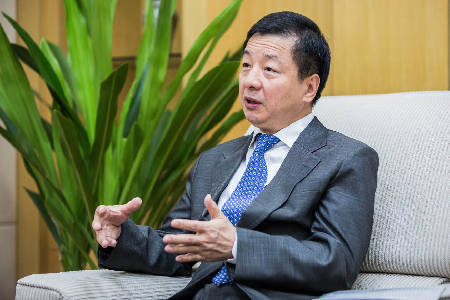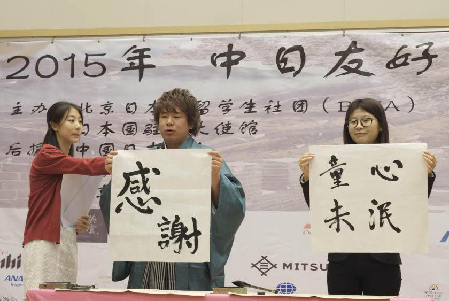High Expectations– CIPG President Zhou Mingwei Elaborates on the Aims of Beijing-Tokyo Forum
AT a press conference last September for the 11th Beijing-Tokyo Forum from October 23 to 25, Zhou Mingwei, president of China International Publishing Group (CIPG) – the Chinese organizer of this annual event – gave an interview outlining the forum’s role in promoting bilateral relations, as well as its highlights and preparations.
|
|
|
Zhou Mingwei expounds the Beijing-Tokyo Forum’s role in promoting bilateral relations. |
Wide Recognition of the Forum
Addressing the background to and position of the forum, Zhou stated that China and Japan jointly launched the forum in 2005. Over a decade of cooperation, it has developed into one of the most influential non-governmental forums. Its scope, initially focusing on topics current in the media, has greatly expanded to include issues in the fields of foreign policy, business and trade, cultural exchanges, and security. This event has grown to become a convocation greatly endorsed by the elites of both countries.
The past 10 years have witnessed great trials and challenges in bilateral relations rarely seen since the normalization of diplomatic relations between China and Japan. The forum, hewing to its original intention of promoting non-governmental exchanges, has discharged a key function in promoting mutual understanding among the two peoples, stimulating benign media debate, and providing policy advice for both governments. It has thus become an invaluable platform for both sides to research and discuss issues of mutual concern.
After 10 years of development, the forum is now highly regarded by both countries, yet it also faces ongoing challenges. Against the backdrop of the adverse circumstance besetting the bilateral relationship in recent years, each country has confronted the question of whether or not the forum should continue, and if so, how to improve it. Upper echelons in both countries affirmatively recommended that CIPG should assume the responsibility for hosting the forum over the next 10 years, which places a seal of approval on CIPG’s initiative to promote Sino-Japanese relations over the past 60 years. It also implies that the forum will creatively introduce new topics, and thus increase mutual trust and break out of the current impasse.
Unique Advantages of CIPG
This year was the first time CIPG served as the Chinese host of this forum, the opening session of a new decade. As to CIPG’s advantages and missions, Zhou noted that in the last 60 years generations of staff members have disseminated content to Japan via books, periodicals and the Internet. This renders CIPG a large network of audiences and friends, and is a basic precondition for its hosting of the forum. The group also boasts an assembly of Japan-researchers and Japanologists, which is a further advantage. In addition, the Sino-Japanese relationship itself, no matter whether in adversity or prosperity, will inject vitality and dynamics into the forum’s future sessions. All of the above has laid a sound foundation for the successful completion of the mission.
Enhancing cultural exchanges, particularly in the field of media, is at the core of CIPG’s daily work. Therefore, the group views the forum as part of its endeavors towards future development, a new platform for bilateral exchanges, and anticipates that it will add new elements thereto.
Although this was CIPG’s first hosting of the forum, the event has accumulated rich experience over a decade. Although new challenges loomed, confidence in the success was strong.
|
|
|
The coming-of-age ceremony held last January at the Japanese Embassy in Beijing, when student representatives from Japan and China displayed their calligraphic works expressing their gratitude and good wishes for the future. |
Forging a Consensus
To improve Sino-Japanese relations and seek a means of resolving the current deadlock, Zhou advanced the following proposals for the forum. First, bilateral relations not only influence the cooperation, peace and mutual prosperity of the two countries, but also affect neighboring countries and Asia as a whole. A major feature of the relationship is that non-governmental exchange constitutes the mainstream and motive force, and is instrumental in the development of bilateral relations. Non-governmental exchange encompasses many unique areas, and the Beijing-Tokyo Forum reflects this circumstance – it is an important platform congregating different voices from both sides in such fields as political relations, business and trade, and cultural exchanges. The primary target of the forum is to effectively channel these voices.
Second, the forum aims to strengthen understanding and improve impressions among the people of the two nations and, moreover, increase mutual political trust and propel healthy long-term development of the bilateral relationship. Following the normalization of diplomatic relations, the improvement evident in mutual impressions and trustworthiness has bolstered the healthy development of relations between the two countries. However, in the last 10 years, discordant and even destructive voices and actions mainly advocated by extreme elements have impaired the relationship. This situation has affected relations between the nations to a certain degree, and also mutual political trust, a key foundation for bilateral relations. Mutual political trust is also bound up with issues of history and territorial sovereignty, which, though extremely sensitive, nevertheless may not be sidestepped. One of the major topics discussed in the forum was how to improve non-governmental impressions and advance mutual political trust based on the effective communication of opinions.
New topics have emerged, such as how to properly interpret a fast-developing China’s influence on the world, and how to handle bilateral relations as the two countries become ever more economically interdependent. Therefore, the third mission of the forum is to provide valuable suggestions for diplomatic policies through face-to-face communication.
Last but not least, the forum is expected to stimulate benign media debate by urging media in both countries to promote stable development of the relationship. Each nation is cognizant of the media’s compelling obligation to help solve problems in bilateral relations. A positive media approach helps break the deadlock. Therefore, one of the forum’s missions is to discuss how to guide the media to activate in a positive way.
Historic Opportunity
This year marks the 70th anniversary of the victory of the Chinese People’s War Against Japanese Aggression and the World Anti-Fascist War, which is why it is a special year for the forum. The Chinese People’s War Against Japanese Aggression was a war of light against darkness, good against evil. It was the longest-lasting modern war, embroiled the largest population, and exacted the most disastrous toll of all. It was also a war in which the Chinese people struggled for and safeguarded peace, and paid the highest price ever for their total victory. The war’s seminal contribution to world peace must forever be borne in mind, not just for the purpose of celebrating victory but, more importantly, to inspire posterity and preserve peace. In his speech at the celebration of the victory, President Xi Jinping mentioned “peace” 18 times. Commemorative activities cleaved to the main theme of striving for peace, and maintaining and preserving peaceful development. They also presented the Chinese people’s view of and resolve to uphold peaceful common development. These commemorative activities afforded many new topics in the development of Sino-Japanese relations for the forum.
In fact, over the 70 post-war years, new elements have continually weighed in on the side of peace, yet worrying factors also linger. Whether or not the two countries can capitalize on the fruits of WWII victory and ensure a lasting healthy development of bilateral ties depends on a sound handling of problems that emerge within their relationship. Certain new trends among Japanese political circles not only warrant concern, but also freight bilateral relations with complicating variables.
Recent amendments to national security laws have elicited great concern among Japan’s public. This sort of large-scale intense reaction by the Japanese people is an infrequent event. They have called for peace in a voice directed not only towards Japanese politicians, but also the international community. This voice echoes the Chinese people’s own aspirations for peaceful development. So the discussion of common development lent itself to a consensus within the forum. Though amendments to their laws lie squarely within the ambit of Japan’s internal politics, the terms thereof also implicate peripheral security. How Japan’s government and politicians treat the fruits of victory in WWII, their position in and attitude towards the post-war international order, and their response to Japanese people’s appeals for peace will remain continuing matters of grave concern.
Managing and controlling differences while safeguarding peaceful development were also topics of common concern within the forum. As of now, many informed persons from both countries have expounded a raft of constructive suggestions, hoping to freely discuss ways to maintain peaceful development and coexistence between the two countries. These suggestions have been positive, practical and forward-looking.
New Bright Spots
With regard to the new highlights of the forum, Zhou stated that in the recent past, leaders of the two countries have met on several occasions; this is crucial for bilateral relations. Efforts by high-level officials and the non-governmental sector have breathed new life into improving and developing bilateral relations. Since last February, Japanese delegations from all walks of life have visited China, thereby greatly contributing to fostering mutual understanding and addressing thorny issues facing the two countries. Noteworthy here is a 3,000-person business and cultural delegation led by Nikai Tosihiro, chairman of the Liberal Democratic Party’s General Affairs Council, that visited China last May. President Xi Jinping received them at the Great Hall of the People in Beijing and delivered a speech. The event was an important effort towards improving the current bilateral relationship. This is just one example from among many which are also points of focus within this forum.
As Asia’s top two economies, cooperation and exchanges between the two countries not only directly influence one another, but also impact the economic development of Asia and even the world. Therefore, the two countries should shoulder common responsibility for economic development and stability of this region and the entire globe. It is precisely their great relevance that places China and Japan in the community of shared destiny. Collaboration benefits both, while struggling enervates each. The economic development of both countries is mutually-influencing, while their degree of cooperation impacts the regional and global economies. In this regard, the forum addressed a new topic: How each country should properly function within a common regional economy.
Japanese Host a Good Partner
On the question of cooperation with the Japanese organizer – the Genron NPO – Zhou advanced a high commendation, confirming that the forum was jointly held by both sides, and organized in rotation. He expressed his profound conviction that one side alone could not have consummated it, and that the Chinese side accordingly greatly appreciated cooperation with its Japanese counterpart. In the last 10 years, the Genron NPO has been dedicated to developing bilateral relations and contributing to peaceful development through non-governmental and media exchanges. It has made strenuous efforts to promote exchanges and form consensus over the last decade, thereby greatly impressing its Chinese counterpart, Zhou said. He voiced the hope that CIPG will continue to work with the Genron NPO as a partner, in tandem with whom to arrive at a greater understanding and consensus; a partner capable of expressing Japan’s wishes, while also addressing China’s concerns. Zhou reiterated his confidence in cooperation with the Genron NPO, and innovating in the process, so carrying forward the legacy of the forum and rendering it able to act in an enlarged future capacity.


